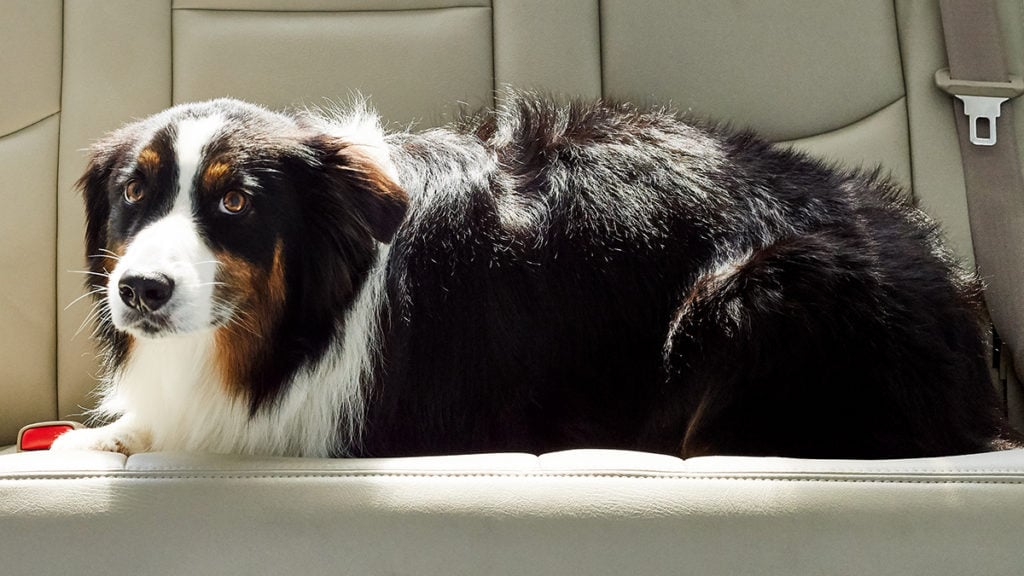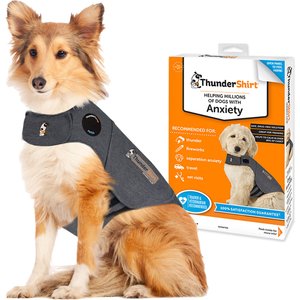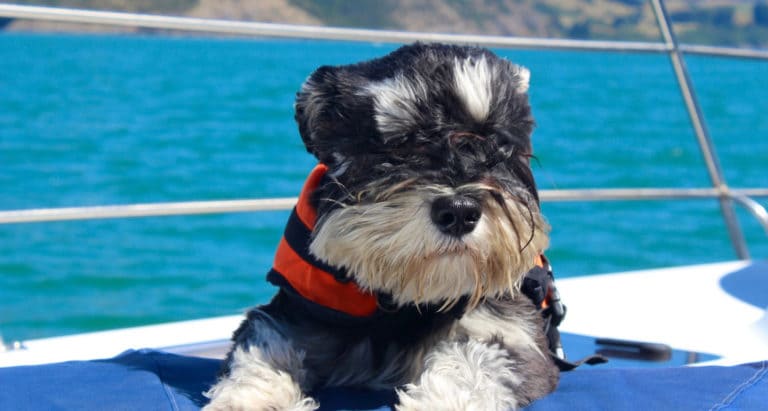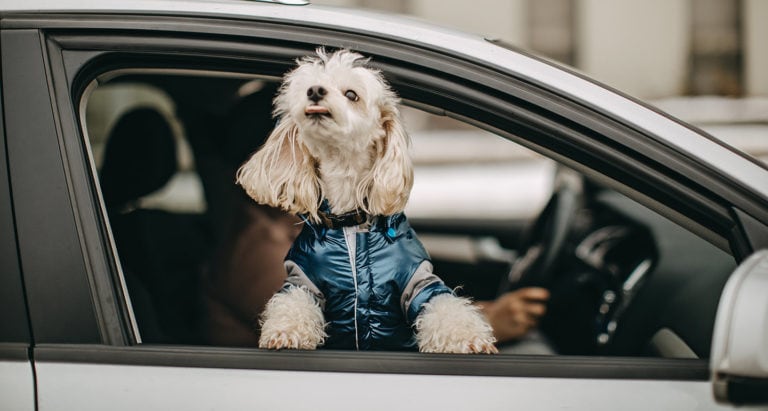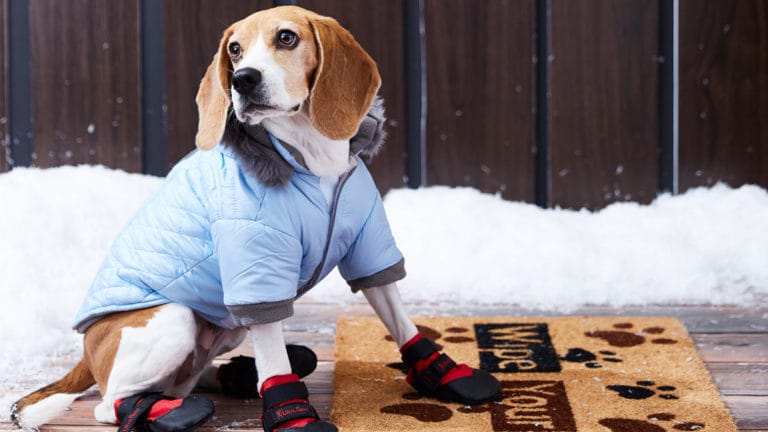For dogs who love a car ride, getting there is half the fun, no matter the destination. For others, jingling keys signal woozy feelings to come—the dreaded dog car sickness.
Whether these dogs are heading to the veterinarian or the park, a car ride is unpleasant for motion-sick dogs, as well as the parents who must deal with everything from pools of drool to messier cleanups, like vomit.
Find out why pups experience motion sickness and what to do if your dog gets car sick.
In This Guide:
What Causes Dog Car Sickness?
Motion sickness is caused by stimulation of the ear’s vestibular system, which maintains balance and equilibrium, says Butch KuKanich, DVM, Ph.D., DACVCP, a professor and department head at Kansas State University’s College of Veterinary Medicine.
“It may be caused by motion, but other diseases that affect the vestibular system can cause it,” Dr. KuKanich says. “Anything that a dog travels in, from cars to boats and planes, can cause motion sickness.”
Motion sickness is common in young dogs because their vestibular system isn’t fully developed. Most dogs grow out of motion sickness, but some equate car rides with feeling unwell, leading to a conditioned stress response that can last a lifetime.
Signs of Dog Car Sickness
Dog motion sickness is obvious in some pups because they either vomit right away or as the trip progresses. For others, the feelings of discomfort are subtle and can include:
- Stress panting, which means the dog is breathing heavily without being subjected to heat or exertion
- Increased licking and swallowing
- Excessive drooling
- Decreased activity
- Whining
Preventing Dog Motion Sickness
There are ways to decrease and prevent dog motion sickness. You may need to experiment with several combinations to find the best result for your canine companion.
Start with these car travel precautions:
- Make sure that your pup is anchored securely in your car to help minimize dog motion sickness. A dog car seat, like the American Kennel Club™ pet booster seat, can help keep your small dog oriented so they’re facing forward, which can prevent the vestibular confusion associated with watching the passing scenery.
- Treating the car seat and surrounding area with a spray solution like Adaptil® Travel Calming Spray can help relax a nervous traveler. The product releases specific pheromones that can help naturally appease and calm pups.
- Avoid feeding your dog four hours prior to your trip. A pup with an empty stomach is less likely to feel nauseous or throw up.
- Consider a calming herbal anti-anxiety option. Dr. KuKanich says that natural therapies such as ginger or turmeric/curcumin with ginger might assist in soothing nervous travelers.
- Put your dog in a calming compression shirt like a ThunderShirt® anxiety & calming dog polo. The patented fit uses a gentle “hugging” sensation to reassure nervous dogs dealing with thunderstorm stress or car anxiety.
- Keep the car temperature cool. A warm car can exacerbate stress symptoms like panting and drooling.
- Crack the windows. Opening the car windows creates a refreshing cross breeze.
If your pup still experiences car anxiety and motion sickness, an over-the-counter option might help. Dr. KuKanich says drugs such as Benadryl® (diphenhydramine) and Dramamine® (dimenhydrinate) are effective in some dogs. However, because some of these human products contain other ingredients, such as acetaminophen and phenylephrine, which can cause dangerous side effects, Dr. KuKanich says to opt for products with the single ingredient—diphenhydramine or dimenhydrinate.
Although most dogs tolerate these drugs well, consult your veterinarian prior to administration of any medication, including over-the-counter medications. Your vet may even prescribe anti-nausea medications or pet medications for anxiety and behavior management.
Training Can Help Dog Car Anxiety
Some dogs respond to behavioral training to develop a tolerance to the stimulus. This type of training enables pups to overcome the associated stress caused by dog car sickness by exposing them to car travel in quick and easy sessions, Dr. KuKanich says.
Follow these steps to help your pup with dog car anxiety:
- Determine exactly when your dog starts to feel nervous about getting in the car. For some, it’s when they’re standing next to it on a dog leash. For others, it’s the moment the car turns on. Your goal is to start with the point that comes right before your dog’s stress reaction. So, for the dog who exhibits stress behaviors like panting and whining when the car starts, allow them to get in the car while it is turned off.
- At that nervous point, feed them a series of tiny, high-value dog treats like chicken or cheese for two to three minutes, and then get out of or away from the car and end the session.
- Repeat this process once daily until you notice your dog getting excited about approaching and hopping into the car. When that happens, it means your dog is comfortable with the foundation step and you can progress to the next one.
- Continue gently exposing your dog to each step of the travel process, giving them treats and making sure they feel confident and happy at each point before you move on to the next one. Note: It’s important to break up the entire process into manageable pieces.
- Your initial “trips” might be as quick as backing out of the driveway and then pulling right back in.
This type of training, coupled with motion sickness management techniques, like cracking the windows and using herbal anti-anxiety support, can help your pup conquer their car anxiety and motion sickness.
Managing Car Sickness Regressions
Sometimes accidents happen, even after you’ve taken every precaution. To prevent messy cleanups if your dog gets car sick unexpectedly, use a water-resistant car seat cover designed to handle whatever your dog dishes out.
The Frisco® water-resistant hammock pet car seat cover protects your car’s seat upholstery and floor, so if your dog regresses and drools or vomits, cleanup is as simple as removing the cover and wiping it off.
Armed with these tips and tricks, you're one step closer to stress-free car rides for you and your pup. Next, check out these 11 tips for surviving road trips with dogs. Happy travels!
Expert input provided by Butch KuKanich, DVM, Ph.D., DACVCP, a professor and department head at Kansas State University’s College of Veterinary Medicine.
This content was medically reviewed by Chewy vets.
Like this story? Check out more of our favorite reads:
Share:
